- Home
- Lauren Oliver
The Screaming Statue
The Screaming Statue Read online
Dedication
Lauren Oliver dedicates this book to her amazing aunt Sandy, for her
support—and copyediting skills!
Once again, H. C. Chester wishes to dedicate the following volume to his
faithful companion (and most appreciative reader!), Trudy.
Contents
Dedication
Chapter 1
Chapter 2
Chapter 3
Chapter 4
Chapter 5
Chapter 6
Chapter 7
Chapter 8
Chapter 9
Chapter 10
Chapter 11
Chapter 12
Chapter 13
Chapter 14
Chapter 15
Chapter 16
Chapter 17
Chapter 18
Chapter 19
Chapter 20
Chapter 21
Chapter 22
Chapter 23
Chapter 24
Chapter 25
Chapter 26
Chapter 27
Chapter 28
Chapter 29
Chapter 30
Chapter 31
Chapter 32
Chapter 33
Back Ad
About the Authors
Books by Lauren Oliver
Credits
Copyright
About the Publisher
“Nothing,” Max said disgustedly, peeling away from the window. Her palms had left prints on the glass. “Not a single stupid visitor.”
Pippa groaned. “It’s too hot for a show,” she said. She was sprawled out on the cool linoleum floor, fanning herself with one of the brochures from the information table, which advertised the museum’s newest exhibit: a pair of ancient scissors said to be the ones used by Delilah to cut off Samson’s hair.
It was only eleven o’clock in the morning and already topping ninety degrees in New York City. The street outside of Dumfrey’s Dime Museum of Freaks, Oddities, and Wonders was as still as a painting. Max, Sam, Thomas, and Pippa had camped out in the lobby overnight, since the attic where they slept with the other performers felt like a steam bath.
“Pip’s right,” Sam said, glancing up temporarily from the steel pipe in his hands, which he was twisting and bending into a circle. “Anyone with a brain is at home in front of a fan.”
“Or swimming in an ice bath,” Pippa said. “Or moving to the North Pole.”
Max sighed. What was the point of perfecting her knife act—what was the point of doing anything?—if there was never an audience to applaud her? Nonetheless, she removed an apple from the basket at her feet and balanced it carefully on the mounted head of a grizzly bear. Then she backed up a dozen feet, wrestled a blindfold over her eyes, lifted the knife, and threw.
She imagined, as she did, that the apple was the face of Professor Nicholas Rattigan: scientist, madman, fugitive.
Maker.
There was a loud thunk.
“Yikes,” Pippa said. “Remind me not to volunteer for your act.”
Max whipped off the blindfold and saw the knife buried deep in the fur between the bear’s glass eyes. She scowled. “There must be a draft in here,” she said.
“I wish.” Pippa began fanning more vigorously.
“What do you think?” Sam held out the metal pipe he had been shaping, which was now a complicated pattern of loops and twists. “Does this look like a rabbit to you?”
“Is it upside down?” Pippa said, squinting.
“It looks like a rabbit that got run over by a garbage truck,” Max said. The heat made her very moody.
Sam sighed and began straightening out the pipe again. “If Mr. Dumfrey would only let me have a real rabbit to model from . . .”
Pippa reached over to pat his foot consolingly. Sam was absolutely desperate for a pet, and was always pushing crackers through the bars of Mr. Dumfrey’s pet cockatoo’s cage and trying to make friends with the mice that lived in the walls. But Mr. Dumfrey wouldn’t let him have an animal of his own, for fear that Sam would accidentally crush, squeeze, or pulverize it, as he often did to doorknobs, railings, and chairbacks. It wasn’t Sam’s fault. As Mr. Dumfrey was fond of reminding him, he was the strongest twelve-and-three-quarters-year-old in the country—possibly in the whole world.
“Listen to this,” Thomas said, smoothing down his hair, which as usual was coated with plaster and dust and refused to lie down flat. Thomas used the stairs only when he couldn’t help it. He mostly preferred to travel the museum’s walls, squeezing himself into the pipes and air ducts, shimmying through narrow spaces hardly wider than a flowerpot, and popping out of metal grates when you least expected it. “What do you call a woman who doesn’t have all her fingers on one hand?”
Pippa groaned again. “Come on, Thomas. Lay off. It’s too hot for riddles.”
“Just try,” he urged. Thomas always had his nose stuck in a book. Lately, it was Brain Puzzles & Teasers. He read even when he was eating; the pages were splattered with tomato sauce and bacon grease.
“Unlucky,” Max said.
“I’d call her normal.” The new janitor, William “Lash” Langtry, sauntered into the lobby, carrying a bucket and a mop. He wiggled the fingers of his left hand. “I’d hate to have all ten fingers on one hand.”
Thomas grinned and shut the book. “Lash wins.”
Max rebalanced the apple on the grizzly’s head, backed up, and took aim again. This time the knife went straight through the core, and the apple, now sliced neatly in two, thudded to the floor.
“Now there’s a pretty trick.” Lash leaned on his broom. “Reminds me of my old bullwhip routine. ’Course I was particular to strawberries . . . Make a nice kind of mess when they explode.”
“Show us,” Max said.
“Yeah, show us,” Pippa said, munching on one of the apple halves.
“Just one trick,” Sam said.
Lash colored a deep red. He turned his attention to the floor and began furiously sweeping the same six-inch patch of linoleum. “I reckon those days are behind me,” he said. “My hands ain’t what they used to be. Eyes, neither.”
The kids exchanged a look. William “Lash” Langtry had known Mr. Dumfrey years and years earlier, when Lash was a world-famous circus performer. He was an ace with a whip: he could snuff out a candle from a distance of forty yards, and knock a stick of gum off the tongue of a volunteer.
But the years had taken their toll. He was as thin as a fence pole and his skin was red and deeply wrinkled, like a sun-dried tomato. And nobody could miss the flask tucked in his waistband, the redness of his eyes, or the way his hands shook, especially in the morning. When he had turned up at the museum only a few weeks earlier, Mr. Dumfrey had given him the only available position.
The once world-famous Lash Langtry was the museum’s new janitor, replacing the late—and not especially lamented—Potts.
Miss Fitch bustled in from the Hall of Worldwide Wonders. “There you are,” she said to Lash in a curiously high-pitched voice. “I’ve been looking all over for you.”
Max swallowed back a snort. Sam rapidly transformed a laugh into a cough. And Thomas opened his book and once again plastered his nose to the page.
Typically, Miss Fitch wore a variation of the same shapeless black dress, black stockings, and black shoes, as if she were always prepared to attend someone’s funeral. But today, she had on a dress in a hideous yellow that made her look like an overgrown banana. Her cheeks were streaked with rouge, applied so recklessly it looked as though a child had been finger painting on her face. Her lashes were thickly clumped with mascara, and her lips were the color of a fire truck.
“Are . . . you all right?” Pippa asked.
/>
“Why wouldn’t I be?” Miss Fitch snapped in her usual voice. She smoothed her hair down anxiously. “The twins insisted on making me up . . . I daresay it’s very silly.” She batted her eyelashes furiously at Lash. Flakes of mascara swirled to the floor.
Sam’s coughing fit got even louder.
Lash tipped his hat. “I think you look mighty pretty, Miss Fitch,” he said.
“Oh, Lash!” Miss Fitch turned nearly as red as her lipstick. “You’re too much.” She let out a series of tittering squeaks. Max felt like she had swallowed a balloon. Was Miss Fitch giggling? “I need your help in the, erm, Hall of Wax. We’re rearranging the French Revolution exhibit and I’m simply not strong enough to move the guillotine by myself.”
“Anything for you, lil lady,” Lash said, offering his arm to Miss Fitch. She squeaked with pleasure again. She was fluttering her eyelashes so fast, it was a miracle she didn’t begin to levitate.
Sam was now coughing so much, his face had turned purple.
“For heaven’s sake, drink some water, Sam,” Miss Fitch hissed, before turning back to Lash and plastering a smile on her face.
As Lash and Miss Fitch proceeded up the stairs to the second floor, Lash’s voice floated back to them.
“Did I ever tell you about the time a lion busted out of its cage and my bullwhip saved a whole passel of people from getting chewed to splinters? No? Why, it must have been twenty years ago now . . .”
Max sighed. She was all out of apples, and she doubted whether Danny, the dwarf, who was doing the cooking today, would spare her any more. Time seemed to be moving at a crawl. She returned to the window, hoping the view might have changed. But Forty-Third Street was as empty as ever. Sergio was trudging slowly down the street from Ninth Avenue, pushing his pretzel cart. Henry, the day porter at the St. Edna Hotel, was sleeping, chin-to-chest, on his stool. Little Jack McDonnell, who lived across the street, was playing jacks on his stoop.
She looked the other way and saw a large red blob carrying a vast handkerchief barreling toward the museum. Then she realized it was not a blob carrying a handkerchief, but Mr. Dumfrey carrying a newspaper. He was red in the face and wearing a typically outlandish outfit: this time, a red silken kimono and matching slippers.
“Mr. Dumfrey’s—” she began. Before she could say back, the front door flew open and Mr. Dumfrey burst into the lobby, waving the paper triumphantly above his head. Max recognized it as The Daily Screamer, the tabloid that had only a few months ago featured several articles, most of them insulting, about the children and their abilities.
“I’ve got it!” he cried. “A guaranteed crowd-pleaser! A surefire showstopper! A bona fide blockbuster! They’ll come running like bees to a flame, like moths to honey!”
“I think you mean like moths to a flame and bees to honey,” Pippa said.
Mr. Dumfrey evidently didn’t hear her. “We’ll be rich!” he said, beaming. “Nothing to drum up business like an execution.”
And he shook out the newspaper so that the headline was visible:
RICHSTONE TO FRY FOR WIFE’S MURDER!
“I don’t get it,” Max said. “What’s so special about this Richbone—Witchstone—whatever his name is?”
“My dear child.” Mr. Dumfrey snatched off his glasses and peered at Max as if to verify that she wasn’t an impostor. “The murder of Mrs. Richstone is an absolute sensation! It’s the crime of the century!”
Six months earlier, heiress Rachel Richstone had been found dead in the bedroom of her Park Avenue apartment, killed by a blow to her head from a golf club belonging to her husband. Rumor was that she had recently become involved with a young Australian fortune hunter, Mr. Edmund Snyder, and that Manfred Richstone was mad with jealousy. Though Manfred protested his innocence, he was arrested and quickly found guilty of murder.
“I think what Max means, Mr. Dumfrey,” Pippa interjected softly, “is what’s Mrs. Richstone’s murder got to do with us?”
“Everything!” he answered gaily. “People are clamoring for every last detail about the case—and we’ll give it to them. Oh, yes. We’ll show them! Just imagine: A new wax installation. A diorama of the whole grisly, gruesome scene, from the bed frame down to the bloodstains. It has the makings of a classic piece: the beautiful heiress, Rachel, clubbed to death by her dashing husband! We’ll be flooded with business! We’ll be drowning in it!”
Thomas had at last abandoned his book and was reading the paper instead. “Mr. Richstone says he’s innocent,” he said, looking up from the article.
Dumfrey waved a hand. “You can’t expect him to say anything else, can you?” he said dismissively. “He’s facing the chair.”
“I don’t know.” Pippa had never liked the Hall of Wax, and Murderers’ Row was her least favorite place in the museum. The small and dusty room on the second floor contained a vast selection of life-sized wax figures and dummy models, depicting famous crime scenes and grisly murders. She avoided Murderers’ Row whenever she could; when she couldn’t, she walked as quickly as possible past the exhibits, holding her breath, as she did when she passed a graveyard. “It seems kind of . . . wrong.”
Dumfrey patted her shoulder affectionately. “Dear, sweet Pippa,” he said, as if she were five years old and not twelve. “Nothing could be more right. We’ll be preserving dear Mrs. Richstone’s memory. We’ll be keeping her spirit alive!”
Pippa shivered. That’s exactly what she was worried about: that somewhere, trapped in those wax bodies, was a live spirit.
“Now let me see. . . .” Mr. Dumfrey tapped a finger on his chin, as he often did when he was thinking. “We’ll take two dummies from the costume room—I’m sure Miss Fitch can spare them. We’ll need new heads, of course. . . .”
Thomas groaned. “I thought we agreed. No more heads.”
In the spring, Mr. Dumfrey’s Dime Museum had suffered a series of misfortunes, beginning with the theft of a prized shrunken head, supposedly a relic from an ancient Amazonian tribe. The Curse of the Shrunken Head had become a citywide sensation, especially when several people turned up dead. The children had been forced to try to clear Mr. Dumfrey’s name when he was accused of murder.
Mr. Dumfrey had been released. But the search for the real murderer had led the children directly into the arms of Professor Rattigan. Brilliant, ruthless, and recently a fugitive from prison, Professor Rattigan had stolen the kids when they were young for his twisted experiments. Now he wanted to use the children to help rebuild his empire. They had barely escaped him, and for two months had lived in fear of his return. But it had been more than sixty days and still no sign of him, so they were at last starting to relax.
“No more shrunken heads,” Mr. Dumfrey corrected him, wagging a finger in Thomas’s face. “This is al-together different. I’ll need to pay a visit to our old friend Eckleberger right away.”
“Freckles!” Pippa exclaimed. She had known Herr Eckleberger since she was little more than a toddler and had invented his nickname then, when she was unable to string together the long series of syllables that made up his name and had instead shortened them into a word her tongue could find its way around. “We haven’t seen him in ages.”
“I never thanked him for the present he sent me,” Sam said. For Christmas, Herr Eckleberger had sent him an impressively realistic bust of Sam’s head, crafted entirely out of candy. Much of the head had been cannibalized by now, so that only one half of Sam’s candy face remained, along with a single jelly bean where his left ear had once been.
“And I never returned the book he lent me,” Thomas said. “The Hidden World of Mathematical Proportions.”
“Please, Mr. Dumfrey,” Pippa said, “can we come?”
Mr. Dumfrey consulted his pocket watch. “All right, then,” he said. “Run along and get your shoes on. Our dear old Freckles is a very busy man.”
Siegfried Eckleberger, nicknamed Freckles, was the closest thing to a grandparent Thomas, Pippa, and Sam had ever known, and Pippa fo
und that even the thought of visiting him lifted her spirits enormously.
For weeks she had been dogged by a nasty, lingering feeling of unease, a feeling kind of like turning a corner and realizing you were lost. More than ever she found herself thinking of the parents she had never known, obsessing about them, wondering whether they were still out there and still looking for her.
She knew why, of course. Until a few months ago she’d always believed that her parents had abandoned her because she was different. But she knew the truth now. She’d been taken from her parents, stolen as a child by Nicholas Rattigan, deranged scientist, to be the guinea pig in one of his terrible experiments. She hadn’t been born different; she’d been made different. Her parents hadn’t gotten rid of her.
Which maybe, just maybe, meant they might want her back.
As they walked, Mr. Dumfrey told Max all about Eckleberger as they left the museum and ventured into the heat, which was as wet and heavy as the slap of a dog’s tongue. A famous sculptor, Eckleberger had once traveled the whole world, molding portraits of queens and dictators, business tycoons and baseball players, out of plaster and wax. He had shaken hands with Al Capone and once, famously, lost a game of bridge to Winston Churchill. He also did work for the police department, creating sculpted busts of wanted men based on the descriptions of their victims; one such model had been used to capture the notorious “Necktie Strangler of Staten Island,” Sergio Voss.
One of Pippa’s favorite stories involved Freckles’s involvement in a government plot in Belgium. Freckles had saved the day by smuggling a critical document from one person to another inside the wax head of Thomas Jefferson, thus saving the country from ruin. To this day, Monsieur Cabillaud, the children’s pinhead tutor and a Belgian, could not see Herr Eckleberger without saluting.
But now he was nearly eighty-five years old, and though he was as smart as ever, and as capable with his hands, he hardly ever left his studio anymore.
“You’ll see, Max,” Sam said reassuringly as they made their way with Dumfrey through the bustle of Times Square. “You’re going to love him.”
“He sounds like a dingbat to me,” Max said.

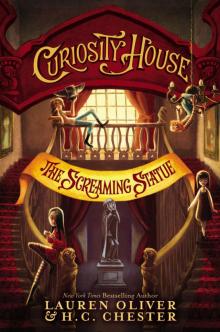 The Screaming Statue
The Screaming Statue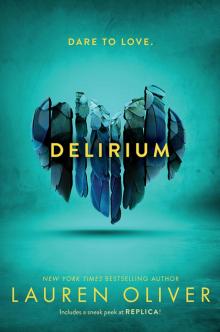 Delirium
Delirium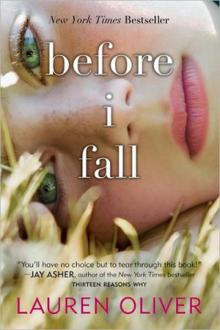 Before I Fall
Before I Fall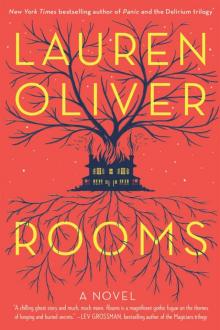 Rooms
Rooms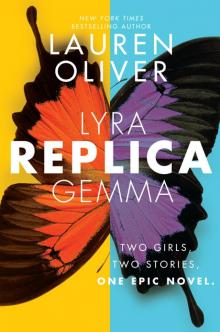 Replica
Replica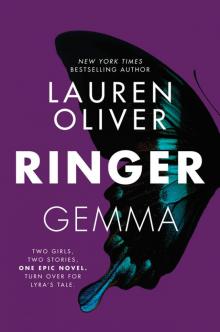 Ringer
Ringer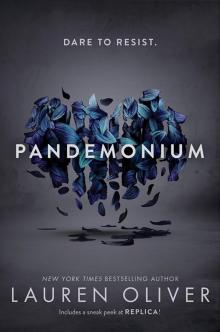 Pandemonium
Pandemonium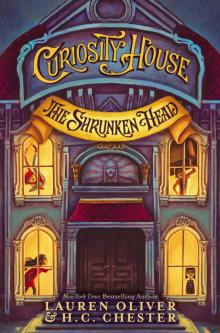 The Shrunken Head
The Shrunken Head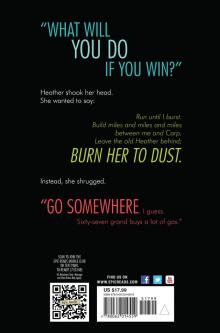 Panic
Panic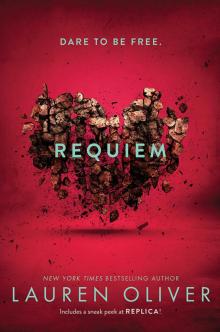 Requiem
Requiem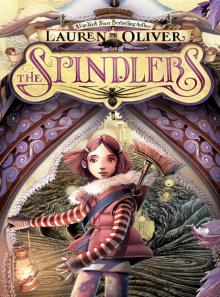 The Spindlers
The Spindlers Annabel
Annabel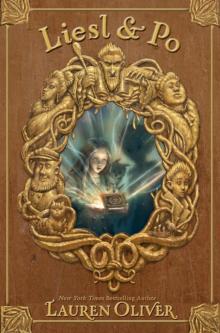 Liesl & Po
Liesl & Po Raven
Raven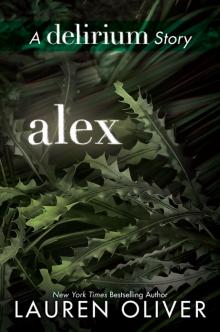 Alex
Alex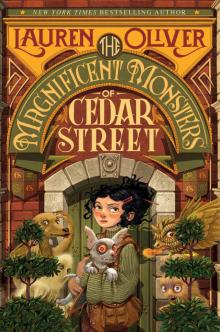 The Magnificent Monsters of Cedar Street
The Magnificent Monsters of Cedar Street Vanishing Girls
Vanishing Girls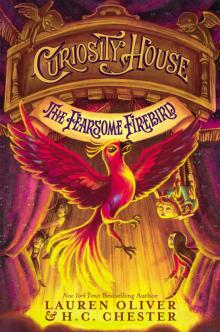 The Fearsome Firebird
The Fearsome Firebird Raven: A Delirium Short Story
Raven: A Delirium Short Story Annabel: A Delirium Short Story
Annabel: A Delirium Short Story Hana: A Delirium Short Story
Hana: A Delirium Short Story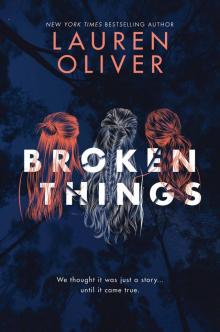 Broken Things
Broken Things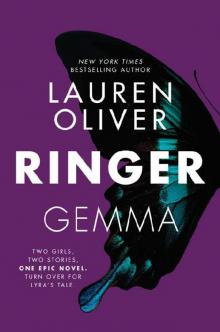 Ringer (Replica)
Ringer (Replica) Alex (delirium)
Alex (delirium)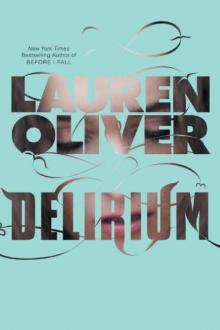 Delirium dt-1
Delirium dt-1